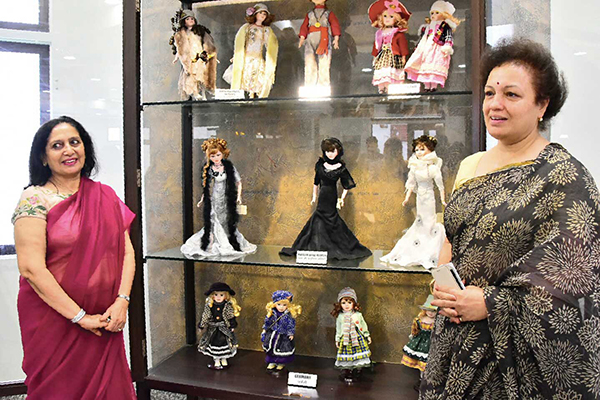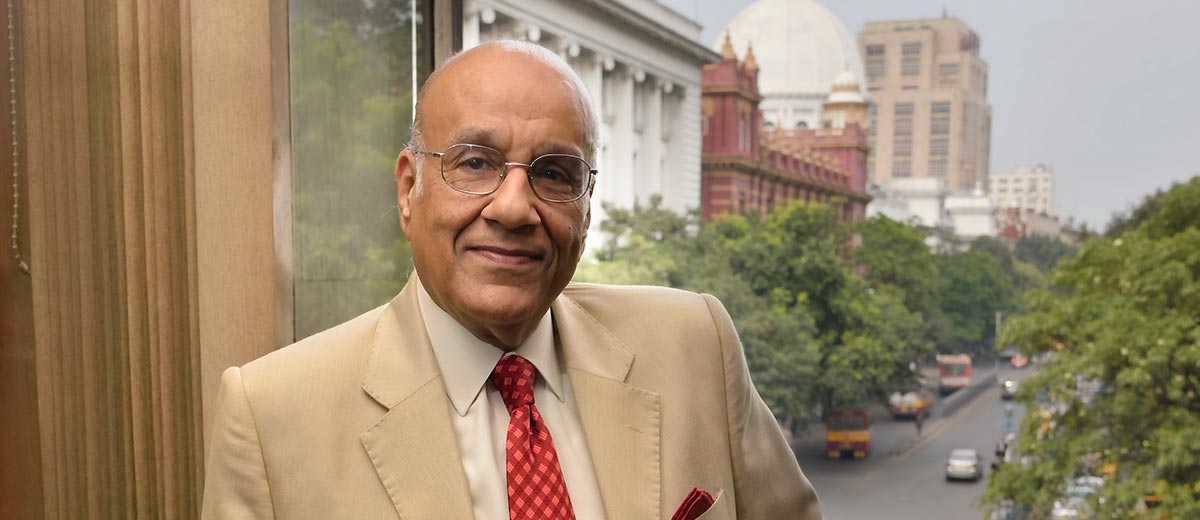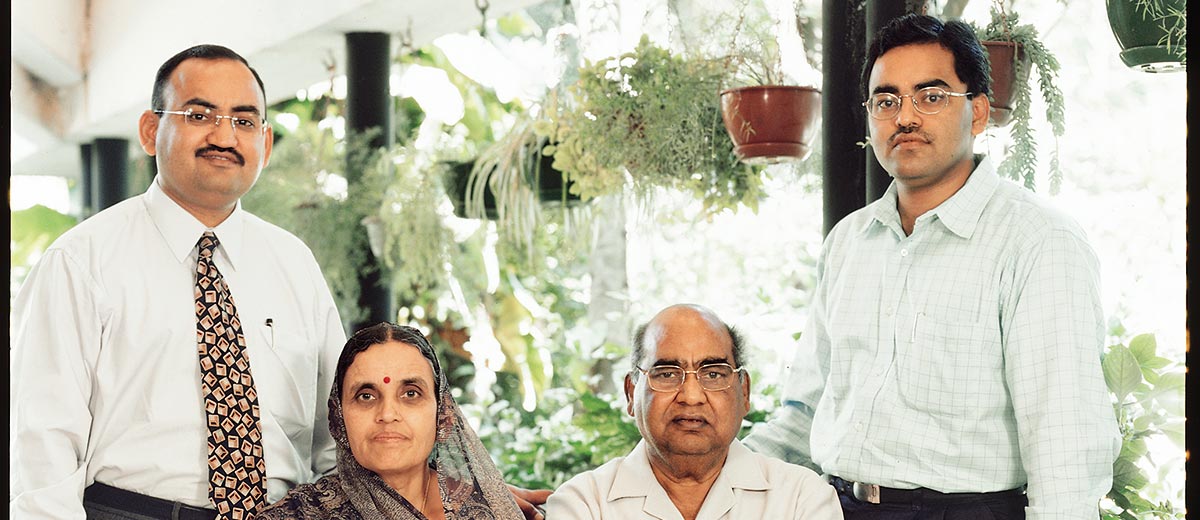
LOCKED ON TARGET
From a colonel in the Indian Army and an Olympic medallist to the Minister of State for Information & Broadcasting, Youth Affairs & Sports, Rajyavardhan Singh Rathore’s journey is both inspiring and commendable. MARWAR met the MP from Jaipur Rural in his plush office in Delhi to know what prompted his transition from an unassuming army man to a key cog in Prime Minister Narendra Modi’s cabinet.
It’s 1pm on a muggy Tuesday afternoon, and we are outside Delhi’s Shastri Bhawan, which houses the offices of several ministries of the Government of India. As we make our way to the area occupied by the Ministry of Information & Broadcasting, we sense a flutter. There is busy-ness in the air. At first, we are asked to wait in the visitor’s room, sipping on a cup of hot coffee. After spending an impatient hour in the room, we are taken to the swanky part of the office—replete with an Apple iMac and an amazing view—to meet our interviewee, Col (retd) Rajyavardhan Singh Rathore.
Till about 13 years ago, this name would probably not have rung a bell. But a lot has changed since then. In 2004, the Indian Olympic Association sent a contingent of 73 athletes to the Olympic Games in Athens, Greece. The then 34-year-old Col Rathore grabbed the attention of both the Indian and the international media by bagging a silver medal in the double trap category. It was the only medal won by an Indian that year. In his words, things were never the same again. “Suddenly there was immense spotlight on me, something I wasn’t used to,” he says.


 Early life
Early life
Col Rathore was born in Jaisalmer on January 29, 1970. He is a proud Rajput, whose family hails from Bikaner. “My father was in the army and was posted around the deserts of Rajasthan at the time when I was born. My grandfather was an IPS officer. He was posted in Jaisalmer. So, I was born there. But we kept moving to different places since my father was in the army. I have studied in many schools—from convents to Kendriya Vidyalayas,” he says.
Joining the army was almost like a tradition in Col Rathore’s family. So, after completing the 11th Standard, he too followed suit and qualified for the National Defence Academy (NDA), thus becoming the fourth generation of his family to sign up for the defence forces. In 1990, he joined the army as an officer. “When you grow up in a military environment, you see soldiers around you all the time. You hear of their deeds. So, you want to be like them,” says Col Rathore, who passed out of the NDA with a medal of the Best Sportman. He was also awarded a Sword of Honour by the Indian Military Academy for being the Best All-Round Cadet.
Col Rathore served in The Grenadiers Regiment of the Indian Army, and even today believes that his life as a soldier was instrumental in making him the person he is today. “The army changes you. It makes you fit, physically and mentally. It enables you to be well-read because, as an officer, you have to be aware of your circumstances at all times. You also get to interact with people from all walks of life because you change locations every two years. The most important thing is that at every given point in time, you have to prove that you are worth your salt,” says the 47-year-old, while reminiscing about how he was just a 23-year-old when he led 180 men for a military operation in Kashmir. “I was the one who was supposed to take all the decisions, even though I was young. Such opportunities require a certain amount of maturity. You have to be an example for others, so your personal behaviour starts changing,” he adds.
The road to success
Even though he was a decorated officer, Col Rathore received mass fame when he diverted his attention to shooting sports. It was something he got inclined towards only at the age of 28, even though he was interested in sports from a young age. Not many know that he was an excellent cricketer when he was younger and had bagged a `800 scholarship in 1985-86 from his school for his cricketing skills.
“I was always good in sports, and guns have been a part of my life from the very beginning because of my military background. But it was while I was in the army that I got an opportunity to try my hand at shooting sports. It happened when I was posted at The Infantry School (a training establishment of the Indian Army) in Mhow, Madhya Pradesh,” says the 2004-2005 Khel Ratna awardee, adding that there was no looking back after that.
He went on to bag 25 medals at prestigious sporting events, including the Asian Games and the Commonwealth Games; but what made him a household name was his performance at the Olympics in 2004. “As an army officer, you are not used to the spotlight because you are not required to speak to the media. And suddenly, I was required to speak to everyone and answer several questions,” says Col Rathore. He feels that his humble upbringing, his education and his training as an army officer, somehow, made it easier for him to handle this new-found celebrity status.
Today though, while sitting in his swanky office and sipping on buttermilk, when he looks back, he feels that all the glamour and fame he received came at a price. “For the first two months (after my win), I was hardly able to eat anything. I was constantly being asked questions. I just didn’t have any time. As a result, I lost a lot of weight. I didn’t even realise what was happening. But one took it in one’s stride and gradually became accustomed to handling the attention,” he says with a smile.
Next stop—politics
After being part of the army for 23 years,
Col Rathore opted for an early retirement in 2013. He then diverted his attention to politics and became a member of the Bharatiya Janata Party (BJP). In 2014, he was elected to the 16th Lok Sabha from Jaipur Rural (it comprises eight Vidhan Sabha segments, namely Kotputli, Viratnagar, Shahpura, Phulera, Jhotwara, Amber, Jamwa Ramgarh and Bansur). The same year, he was also sworn in as the Minister of State for Information & Broadcasting, a portfolio he still holds.
Col Rathore, who was felicitated with a Padma Shri in 2005, however, says joining politics was never part of his initial plan, as no one from his family has been in politics. Yet, he took it up as a challenge.
“Typically, politicians are a hated lot in our country. And our PM (Narendra Modi) has played a major role in trying to change that image. When India got its Independence, we had leaders who were respected. Somewhere in between, Indian politicians came to be associated with just corruption. But, thankfully, things are rapidly changing now. As an army officer and a sportsperson, I have been straight in my thought, in my words and in my actions. I realised that this challenge is worth taking, although I didn’t know anything about politics back then. I didn’t even have the deep pockets associated with elections and campaigning. But I jumped in because that is what I have always done in my life,” reveals
Col Rathore.
In the past two years, Col Rathore feels, he has learnt a lot about news, media and everything else related to films and entertainment. “I now know what happens behind the doors and it’s interesting. This is a new learning experience for me,” he says. But he confesses that he still has a long way to go. In fact, ask him if he has ever considered handling the sports ministry owing to his background, and he swiftly diverts from the topic, only saying, “Just because someone has a particular background, it doesn’t necessarily mean that he or she should be restricted to that particular field. There are always new things to learn.” Incidentally, a few days after the interview, post the cabinet reshuffle by PM Modi, we learnt that the 2004 Olympic Games double trap silver medallist has been appointed Minister of State for Youth Affairs and Sports.
But doesn’t he miss his army days, we ask, and prompt comes the reply, with a smile, “The way the Modi sarkar functions, it is quite similar to an army unit. So, that way, I don’t miss those days much,” he says, quickly adding, “But of course, I miss the company of the jawans and my fellow colleagues.”
Personal time
Political life can be rewarding, but it can also be daunting when it comes to balancing work with personal life.
Col Rathore opens up about the lack of time he has for his personal life owing to his political commitments. “Your entire time is for the public. Like on most days, I do not get the time to even have lunch. And on the days when I do have lunch, it’s usually while sitting with a stranger. Your time belongs to the public. They have the right and the authority to see you at any given point of time,” he says.
In fact, even when he gets some time from his many responsibilities, Col. Rathore likes travelling to his constituency. Meeting people there and being able to do something for them gives him a sense of satisfaction. “I look forward to travelling in my constituency. It’s so beautiful when you leave the highway and go into the interiors,” he reveals.
On the personal front, Col Rathore’s son, Manavaditya (18), has also been participating in shooting competitions for the past five years. He is a member of India’s junior shooting squad. On the other hand, his daughter, Gauri (15), is more “creatively inclined”. “My son is passionate about fitness and sports, and my daughter is creative. I think that her creativity comes from my wife, Gayatri.
She is a doctor and after passing out from New Delhi’s Lady Hardinge Medical College, she joined the army. She took premature retirement as a major after serving for five years, as she decided to devote her time to bring up our children since I was always travelling,” he says.
Col Rathore vehemently puts across the point that he will always want his children to choose their own paths and have their personal goals. He feels that an increasing number of people are devoting their time to what they want to do. Hence, there is no dearth of professional opportunities. “Anything that you are passionate about, you should do that,” opines the minister.
The next step
Col Rathore’s comfort and enthusiasm as a politician is hard to miss. In fact, even his connection with his staff is visibly warm. When he walked in, a staff member even commented, “He is always so busy, yet so energetic.” Yet, we couldn’t stop ourselves from asking him this question, ‘Would you ever like to return to shooting?’
Maybe we already knew the answer, and the ex-shooter, perhaps it is safe to call him that now, didn’t disappoint when he said, “Not really. I feel that in life, we must not hold on to anything. We must be willing to take up new challenges. I have done well in the past, but that doesn’t mean that I should be doing only that. If a new passion comes up, you take that up. So, rather than sitting on the laurels of your past performances, you should just walk ahead and try something new.”
Point noted.










